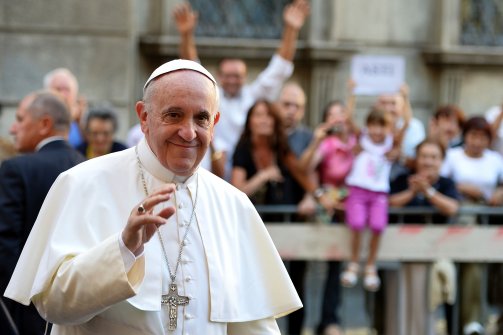Pope Francis’s Rough Road to Reform
By Barbie Latza Nadeau
This week, Francis called his group of eight reformist cardinals to the Holy See for their inaugural summit on reform. The pope appointed the eight in April, tasking them with the tough job of prioritizing the Vatican’s many woes. The group is made up of Sean O’Malley of the United States, Oscar Rodriguez Maradiaga of Honduras, Giuseppe Bertello of Italy, Francisco Javier Errazuriz Ossa of Chile, Reinhard Marx of Germany, Laurent Monsengwo Pasinya of the Congo, George Pell of Australia and Oswald Gracias of India. They have been interviewing church leaders and clergy in their home continents to bring what should be a comprehensive list of problems to the pope’s table. In July, O’Malley told National Catholic Reporter’s John Allen he was interviewing cardinals in the United States and Canada to “get ideas for reform.” Allen, who has his pulse on the Vatican heartbeat like few others, says the so-called G-8 cardinals will have far more reach than as just advisors, even though it remains to be seen whether they will just be “a kitchen cabinet that doesn’t appear anywhere on formal Vatican flowcharts,” he wrote in his recent column on the summit. “The pope takes the G-8 seriously, which means everybody else in the Vatican is obliged to do so as well.” The summit proceedings are strictly secret, in keeping with the Vatican’s standard practices, but they were said to have more than 80 documents to review to build a roadmap to reform. One of their foremost priorities is cleaning up the messy books at the Vatican bank, known as IOR, which has been investigated on a European level for money laundering. Separately, on Tuesday, the day the summiteers met for the first time, the Vatican bank also published its financial accountancy for the first time in its long history, revealing an impressive 2012 profit of $116.9 million, four times higher than the previous year. The bank has been involved in a string of unseemly cases, including the June arrest of an Italian prelate dubbed “Monsignor 500” who earned his nickname from the rolls of 500-euro bills he seemed to always have. He was arrested for trying to sneak $26.2 million from secret Swiss banks, and had a long financial history of creative accounting through the IOR. The G-8 cardinals are also expected to visit some of the church’s broader issues, including whether or not divorced Catholics can marry without the tedious procedure of securing an annulment. Francis has made it clear that he isn’t so interested in a parishioner’s past, even hinting in a lengthy interview in September with Jesuit publications that confession can pave the way for broader forgiveness. Right now, a woman who is divorced or who has had an abortion is not allowed to take communion in Catholic mass. “I also consider the situation of a woman with a failed marriage in her past and who also had an abortion. Then this woman remarries, and she is now happy and has five children. That abortion in her past weighs heavily on her conscience and she sincerely regrets it. She would like to move forward in her Christian life. What is the confessor to do?” he asked the Jesuit journalist. Pope Francis has only been in the job for six months, and his promise of reforming the Curia may just be the tip of the iceberg. In another far-reaching interview, this time with Eugenio Scalfari, the atheist founder of the Italian newspaper La Repubblica, Francis ruffled feathers by calling his predecessors and many church leaders “narcissistic.” “I don’t like the word narcissism, it indicates an excessive love for oneself and this is not good,” the pope told Scalfari. “The real trouble is that those most affected by this—which is actually a kind of mental disorder—are people who have a lot of power… Heads of church have often been narcissists, flattered and thrilled by their courtiers. The court is the leprosy of the papacy.” The comment was no doubt aimed at those who have driven the church to the brink of disaster. But not everyone is impressed. Paul Vallely, author of one of the first assessment books on Francis, Untying the Knots, says Francis has hit a nerve. “Conservative Catholics have struggled with all this, stuttering that the new pope was changing no doctrine but merely offering a different style.” But he has only been in the job for six months, and his promise of reforming the Curia may just be the tip of the iceberg. So far, Vallely says the pope’s initial decisions have upset many of the Vatican’s traditional insiders. When Francis replaced secretary of state Tarcisio Bertone with the well-liked Pietro Parolin, Vallely says Bertone “departed with bitterness, lashing out against the crows and vipers who had undermined him.” Francis has also “upset traditionalists in Rome by announcing he will stop granting elite priests the honorary title of ‘monsignor’ with its anachronistic aristocratic resonance—it means “my lord.” A move that falls in line with Francis’s more simplistic approach to the church. When the G-8 cardinals finish their reform summit, they will accompany Francis on his Assisi pilgrimage before going back to their home diocese. Then the pope is expected to get to the real work of tough reform, using the summit as a launching pad. No one knows exactly what those reforms will look like, or whether they will eventually dip into doctrine, but one thing is clear: the road ahead will not be an easy path to follow, even for a pope as popular as this one.
|
.
Any original material on these pages is copyright © BishopAccountability.org 2004. Reproduce freely with attribution.
